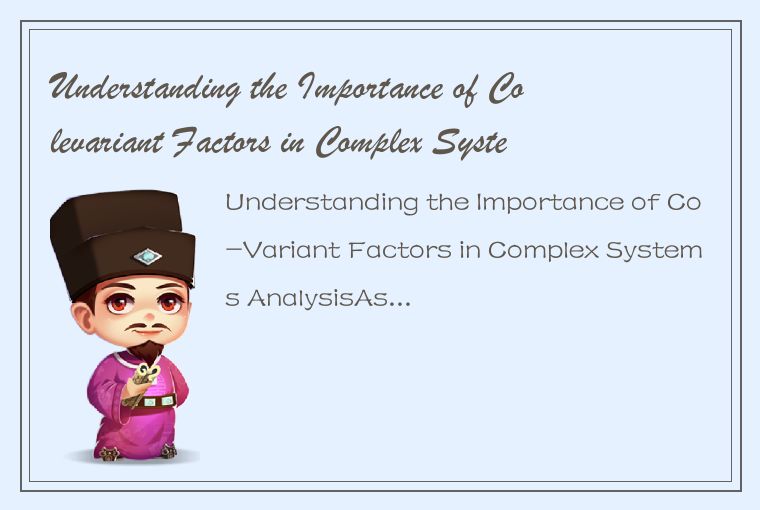Understanding the Importance of Co-Variant Factors in Complex Systems Analysis

As we try to comprehend complex systems, we often overlook the importance of studying co-variant factors. In simpler terms, co-variant factors are variables that increase or decrease in a relationship with another variable. In other words, they are variables whose variation depends upon the variation of the other factors. Properly incorporating these factors in complex systems analysis can result in a more holistic understanding of the system in question. In this article, we will dive deeper into the concept of co-variant factors and their crucial role in complex systems analysis.
To start, let us consider an example. Suppose we want to understand the factors that affect the sales of a tech company. Here, we might identify key variables such as marketing budget, product quality, and competitor activity. However, we might not consider the impact of the broader market conditions on the sales of the company. For instance, an economic recession could significantly affect the purchasing power of consumers and decrease the company's sales, irrespective of how well their marketing campaigns or product quality is. Here, market conditions are co-variant factors that should be included in the analysis.
Another crucial aspect of co-variant factors is that they are interlinked. That is, the relationship between variables is not linear but rather complex and interdependent. This makes it harder to isolate individual variables as the root cause of a particular outcome. Take, for instance, a city's traffic system. It is not enough to measure variables such as the number of cars on the road or time of day to understand traffic patterns. Other factors such as weather conditions, driver behavior, road capacity, and timing of major events can affect the traffic system in unpredictable ways. Here, the key is to identify and incorporate these co-variant factors into the analysis.
Furthermore, co-variant factors are subject to change and evolve over time. An analysis that was relevant ten years ago may no longer hold true today due to changes in the environment, technology, or societal norms. Understanding this dynamic nature of co-variant factors is critical when analyzing complex systems with long-term implications.
So, why are co-variant factors typically overlooked in complex systems analysis? One reason could be the complexity and vastness of the data required to uncover co-variant relationships. It takes significant effort and expertise to identify and incorporate co-variant factors into the analysis. Another reason could be the inherent bias towards linear and deterministic models in scientific analysis, which limits the scope of complexity that can be explored.
In conclusion, co-variant factors play a vital role in understanding complex systems. A complete understanding of a system requires us to identify and incorporate these co-variant factors into our analysis. Doing so will give us a more holistic and accurate picture of the system in question. The key lies in recognizing the interdependency and dynamic nature of co-variant factors and being prepared to navigate the complexity of the data required to analyze them. By embracing the concept of co-variant factors, we can improve our understanding of complex systems and make better-informed decisions.




 QQ客服专员
QQ客服专员 电话客服专员
电话客服专员